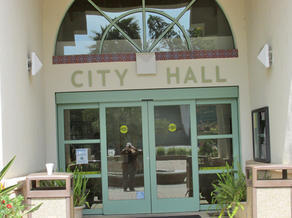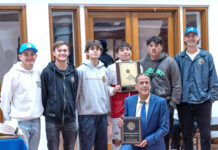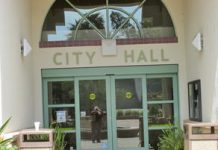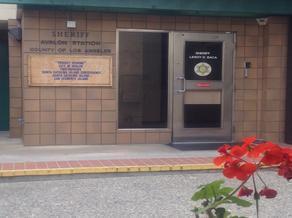Blue stickers, the waiting list, and ‘floaters’ among issues considered
Part 2 of two: permits.
The second half of the council’s recent discussion of transportation issues looked at the city’s vehicle permits. City Manager David Maistros said one thing he had learned is that the city’s vehicle code is too big to tackle everything. That was his goal, but it wasn’t going to happen so instead staff would try to break it up into smaller components that the city could address.
According to Maistros, speaking at the Dec. 14 workshop, is that as various councils encountered problems over the years, they added something to the code. Then there were what Maistros called “mythical grandfather provisions.”
Turning to the subject of vehicle permits, Maistros said the list of different types of permits went on endlessly. There are four different commercial stickers, according to Maistros. According to Maistros, the city hopes to reduce the number of stickers, although he wasn’t sure how that would be achieved.
The slide also reported that there is supposed to be one residential autoette per unit. According to the slide, there are 2,096 residential units currently counted. A slide put the number of autoettes (both residential and commercial) at 1,846.
One of the residential stickers is the prized blue sticker.
Maistros also said the city had to address “floaters,” and adopt legislation to allow or not allow them. He said staff proposes not permitting floater permits.
Maistros said you can have 60 floater” permits but you can use them for 80 vehicles. Using the Catalina Island Conservancy as an example, Maistros said they could by 30 floaters to cover their entire fleet. Councilmember Michal Ponce said they shouldn’t have floaters.
Councilmember Mary Schickling said she thinks the the “floater” idea is crazy. She argued that when you start a business, you have to have a business plan and that would include knowing how many vehicles you would need.
Maistros argued that the Conservancy could not know which vehicles will be used in the city and which will not.
Turning to another issue, Maistros said the state is mandating that all new vehicles be electrical by 2035. Avalon staff recommended phasing in electronic vehicles. He said the city can start looking at putting in charging stations. The city could waive building permit fees for charging stations and establish electric vehicle only parking spaces.
Maistros said the city needed to do a fee study analysis. He believes city staff can do that internally.
Then there’s the problem of illegal, abandoned, and non-operational vehicles. Maistros pointed out that Avalon doesn’t have an impound lot. Avalon does not have a tow truck. Officials need permission to go onto private property to enforce code.
According to Maistros, staff suggests an amnesty program that would waive all or a percentage of the fines on the condition that the owners get their vehicles registered. Inoperable vehicles would be signed over to the city.
Councilmember Lisa Lavelle said the city needed to look at the issue of density. She said she would love registration to be tied to where you physically live.
Maistros said he had a goal of addressing the weight of vehicles.
Mayor Anni Marshall said the city needs to figure out how to get rid of the noisy ones.
On the subject of the blue stickers, Schickling said some names appeared on the list five times; some of the people listed have died.










